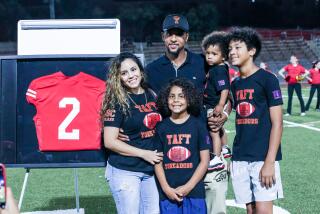Master Guidance : The Raiders’ Anthony Smith Benefits From a Relationship With Hall of Famer Deacon Jones as He Lives Life of a Rising Star
- Share via
One man is 53, the other 25.
One lives in Calgary and the other in Los Angeles.
One has tasted fame and glory, the other hungers for it.
Defensive lineman Anthony Smith of the Raiders and Deacon Jones, a former Ram lineman and a member of pro football’s Hall of Fame, would appear to be at opposite ends of the spectrum.
But these opposites attract.
Jones, twice the NFL defensive player of the year, has formed a bond with Smith, who has come on so quickly in his second year of play that he is second in the AFC with nine sacks and first on the Raiders with six forced fumbles.
The basis of the bond is their profession. But Smith sees Jones as so much more, a mentor who can guide him through the complicated lifestyle of a young, rising athletic star in a town that has been known to chew up and spit out so many like him.
“The things he tells me,” Smith said, “don’t just apply to football. They apply to life.”
Their long-distance friendship began several years ago at a charity golf tournament.
Smith, who played at Alabama and Arizona, was the Raiders’ No. 1 draft choice in 1990. But a knee injury cost him that season.
It was during Smith’s rehabilitation that he met Jones. The Ram great saw a lot of himself in Smith.
“I saw a young man anxious to learn,” Jones said by phone from Calgary, where he serves as an adviser and marketing consultant for the Calgary Stampeders of the Canadian Football League. “I saw the frustrations. I know how the game can disappoint you. But you have to rise above that if you want to be the best. You have to wait until your time comes. Even for the best in the world, it doesn’t come easy.
“It’s not just a matter of physical talent. You have to discuss football. You have to talk to someone who has finally mastered the damn game.”
That would be Jones, a member of the Rams’ Fearsome Foursome three decades ago. Along with Lamar Lundy, Roosevelt Grier and Merlin Olsen, Jones was part of one of pro football’s most memorable lines.
That line might be ancient history to many players, but not Smith.
“Those were the times back in the ‘60s,” Smith said with a gleam in his eye. “I would have loved to have played then. I never wanted to emulate anybody before, but I want to be a Deacon Jones.”
Smith was eager to learn from the master, but naturally wary of an outsider working at cross purposes with the Raiders’ distinct style of play.
It hasn’t been a problem.
Jones will watch the Raiders play and be on the phone to Smith soon thereafter if he spots his protege developing bad habits.
“I didn’t know how it would work,” Smith said. “But (Raider defensive line coach) Earl Leggett is the best in the world. He works with me on my style of play and my technique.
“Deacon polishes me and Art (Shell, Raider coach) helps me deal with problems and motivates me. It’s worked out.”
Shell, a Hall of Famer as an offensive lineman, says the 6-foot-3, 270-pound Smith “can be as good as he wants to be.”
While the Raiders work on how Smith tackles opposing players, Jones spends much of his time working on how Smith tackles life off the field.
“You have to talk about becoming famous,” Jones said. “You got to play the game, live the life, walk the walk. A lot of things come at you fast.
“You become a target, so you’ve got to learn to defend yourself, defend your territory, make sure you’re not distracted away from your main focus.”
One possible distraction Jones lectures Smith on is money.
“You have to separate money from the game,” Jones said. “Once you sign your contract, money becomes obsolete. If you get $10 million, that does not mean you are going to be the best football player.”
The subject of big contracts brought forth the name of Brian Bosworth, who bombed out of football after several disappointing seasons with the Seattle Seahawks.
“He never had the attitude,” Jones said of Bosworth. “He came in thinking he was already a star. Anthony comes in wanting to be a star. He (Bosworth) was a sorry football player. He will have to go through life knowing he did not give his best.
“You want to know you left the game better than you found it. We are just caretakers of the game, all of us, owners, coaches and players.”
Smith feels that responsibility. He, too, has devoted time to working with those who might benefit from his experience. But in Smith’s case, the youngsters he deals with are underprivileged kids living in South-Central Los Angeles.
Smith, who had his troubles growing up in a rough section of New York, has become a hero to many kids in Los Angeles.
“These kids cannot succeed because of where they are,” Smith said. “They feel their inability to prosper comes because they are black.
“You can’t fight a negative with a negative. I try to show them something positive, be a positive person.”
That might mean taking the kids to an amusement park or something as simple as giving them a meaningful poem.
“You take something out of a neighborhood,” Smith said, “you’ve got to put something back.”
Another lesson learned from Deacon Jones.
More to Read
Go beyond the scoreboard
Get the latest on L.A.'s teams in the daily Sports Report newsletter.
You may occasionally receive promotional content from the Los Angeles Times.










